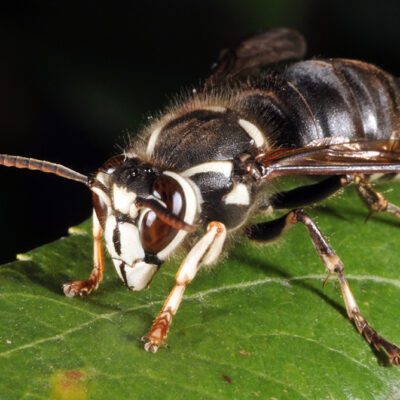by David Moore
Manager of Technical Services and Board Certified Entomologist
with contributions by Eric Smith, PhD, BCE

Bald Faced Hornet: Credit to Purdue
It’s that time of year where many insects will begin to wake up and start flying around. This time of year is when overwintering bees, wasps, and hornets will begin to emerge from their shelter where they hid all winter and start new colonies. Soon their nests will be thriving with life and many times these insects are found in areas frequented by people. Although many of these insects are beneficial to the environment, we should look at ways in which we can limit our family’s exposure to them. Since spring seems to be defying the groundhog this year and has come a bit early, some of these emerging insects might be seen sooner rather than later.
There are many types of bees, wasps, and hornets that can cause you and your family harm. All stinging insect issues should be approached by a pest management professional due to any potential health hazards that could be associated with the issue. How severe a stinging insect reaction will be varies from person to person.
A normal reaction will result in pain, swelling, itching, warmth and some redness at the site of the sting. Reactions to normal stings usually happen within a minute and can last a few hours. However, some individuals are more sensitive and can have symptoms that can last a few days. Others have a large reaction and will have the same results as a normal sting, but the reaction will spread beyond the affected area which can encompass a complete limb. Additional symptoms for large reactions can include tiredness and a low grade fever. Large reactions to stings may have the symptoms peak after two-three days and may last up to 10 days. These types of reactions are typically not dangerous for an individual.
If an individual has an allergic reaction (anaphylactic reaction) then they need to get medical attention immediately.  Symptoms may include itching, hives, swelling of the throat or tongue, difficulty breathing, dizziness, stomach cramps, nausea or diarrhea. Some individuals will have their blood pressure fall rapidly and may go into shock and lose consciousness Anaphylaxis is a medical emergency and may be fatal if the individual does not get medical attention immediately.
Symptoms may include itching, hives, swelling of the throat or tongue, difficulty breathing, dizziness, stomach cramps, nausea or diarrhea. Some individuals will have their blood pressure fall rapidly and may go into shock and lose consciousness Anaphylaxis is a medical emergency and may be fatal if the individual does not get medical attention immediately.
To help prevent getting stung, here are some common elements to follow. Be aware that the food and beverages you are consuming are probably the reason why they wandered over to your area to begin with. Be especially mindful of soda can and juice drinks since insects can fly into those containers easily. Trash containers are another area that insects are highly attracted to.
Make sure you are being careful in your spring frolicking since where you are playing can put you in a direct path with stinging insects as well. Disturbing a nest in the woods, by a woodpile, in a shrub, or in a garden can incite in these insects to swarm and sting anyone nearby.
Being aware of what you are wearing will help reduce your risk as well. Wearing perfumes and colognes and brightly colored clothing attract stinging insects. Wearing closed toe shoes will help reduce your risk of being stung. Be particularly mindful of this when walking through grass with clover, by the swimming pool and in flower gardens.
 Finally, if someone is the unfortunate victim of a sting, treat the sting as soon as possible. If a stinger was left in the skin, remove it as soon as possible to limit how much venom gets injected. A fingernail or credit card make great scrapers. Do not squeeze the stinger, or you may force unnecessary venom into the victim. If a hornet or wasp is stinging an individual repeatedly, briskly remove the insect and get the individual a safe distance away as soon as possible. Raising the affected limb and applying a cold compress will help to reduce the pain and swelling. Some individuals will use an anti-histamine to help with any itching.
Finally, if someone is the unfortunate victim of a sting, treat the sting as soon as possible. If a stinger was left in the skin, remove it as soon as possible to limit how much venom gets injected. A fingernail or credit card make great scrapers. Do not squeeze the stinger, or you may force unnecessary venom into the victim. If a hornet or wasp is stinging an individual repeatedly, briskly remove the insect and get the individual a safe distance away as soon as possible. Raising the affected limb and applying a cold compress will help to reduce the pain and swelling. Some individuals will use an anti-histamine to help with any itching.
If an individual has an epinephrine injectable (epi-pen) due to a severe reaction, remember that this is a rescue medication. They still need to visit a medical professional as soon as possible to ensure they are safe from further harm. People who have experienced an allergic reaction to an insect sting have a 60% chance of a similar or worse reaction if they are stung again.
Once again, if you run across a situation which could include a stinging insect issue, a professional pest management professional should be consulted. A pest management professional will be able to evaluate your home and give you the safest treatment option to reduce you and your family’s risk to being stung.
